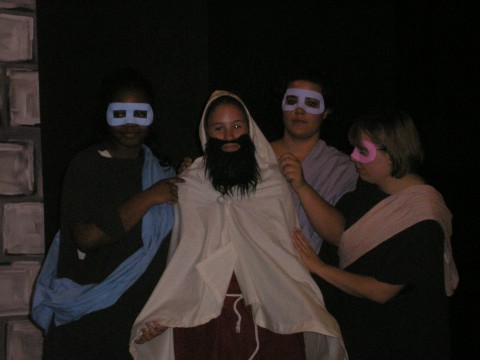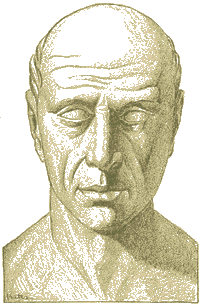 |
||||||||
|---|---|---|---|---|---|---|---|---|
|
|
Gender Within Roman Comedies
Plautus' Poenulus (Towelheads)
Terence's Hecyra (The Mother-in-Law) There are five characters that stand out in Hecyra, three of which are women. The first woman is Sostrata, mother of the main character Pamphilus. Sostrata is the typical Roman wife and mother, she looks out for her family and does everything possible to keep them happy and please them. When her husband accuses her over and over again for being the reason that Pamphilus’ wife, Philumena, has left, Sostrata claims over and over again that she is not guilty. In her monologue in act II scene 3 she states, “I’ve always treated the girl just like my own daughter!” It is here that we learn that Sostrata really is a good Roman wife, she would be expected to invite the girl in with open arms and she claims that that is exactly what she did. As the story gets even more complicated and the end is nowhere in sight, Sostrata tells her son that she will leave and go live outside the city so that Philumena may move back in with him. She is willing to sacrifice her city life so that her son and his wife will be happy and alone. Sostrata is a prime example of a Roman wife and mother because she puts her family before herself. The second female character in this play is Myrrhina, the mother of Philumena. When Philumena comes home to her mother, Myrrhina does everything she can to care for the girl. Myrrhina only wants the best for her daughter and when it’s discovered that Philumena is pregnant and Pamphilus is not the father she does the best she can to cover it up. She knows that if it gets out to everyone that her daughter wasn’t a virgin when she was married that she would be shamed and Pamphilus would not be obligated to stay married to her. When Pamphilus discovers the truth, Myrrhina begs him not to leave her daughter and says that she will get rid of the baby so no one has to know. Myrrhina is clearly concerned with her daughter’s wellbeing and with keeping her family’s good name, just like a mother should be. The third female character is a courtesan named Bacchis. Bacchis was the first love interest of Pamphilus but she gave him the cold shoulder when he got married. Bacchis plays an important role because she is the character who reveals the truth to the main characters and brings about the resolution. Before Pamphilus was married, he rapped a girl and stole her ring. He then gave that ring to Bacchis and she wore it because courtesan’s liked to receive gifts. When Bacchis goes to talk to Myrrhina and clear her name so that she does not get blamed for Pamphilus leaving his wife, Myrrhina recognizes the ring which once belonged to her daughter. Pamphilus had in fact raped his wife before they were married. If Bacchis had not had the ring, the conflict of who the baby’s father was would never have been resolved. The two main male characters in this play are almost opposites of each other. Pamphilus is a young man who is distraught because he is in love with Philumena but she had another man’s baby. He tries desperately to do the right thing but has a hard time deciding if he should stay by his wife or his mother. He tries to put his needs aside in order to make the right choice. Eventually he comes to the conclusion that it would be right for him to be with his mother and leave his wife. Since he believes that Philumena has just had a baby by another man he is not obligated to stay with her. When it is revealed that the baby is indeed his, he rejoices because he can stay with his wife. Laches, Pamphilus’ father, is a different sort of man. He is portrayed as selfish and he never cares about the needs of others. He is constantly putting himself before everyone else, including his family. Laches also goes around accusing everyone of being the problem of the conflict. First he accuses his wife saying that she must have driven Philumena off and he makes her pack to go live on the farm. When he finds out that Philumena had a baby, he blames her mother Myrrhina for keeping it a secret and making the girl come home. Finally he blames everything on Pamphilus saying that if he wasn’t always lusting after Bacchis none of this would have ever happened. Laches is a very rash man who would rather point the finger at someone than take the time to find out the actual truth. In the end, he believes that he has figured everything out and helped resolved the conflict but really he’s clueless to what really happened.
Berg, Deena and Parker, Douglass, trans. Plautus and Terence: Five Comedies. Indianapolis: Hackett Publishing Company, Inc, 1999. Richlin, Amy, trans. Rome and the Mysterious Orient: Three Plays by Plautus. California: University of California Press, 2005. |
|||||||
For questions or comments, please contact John Gruber-Miller |
||||||||


